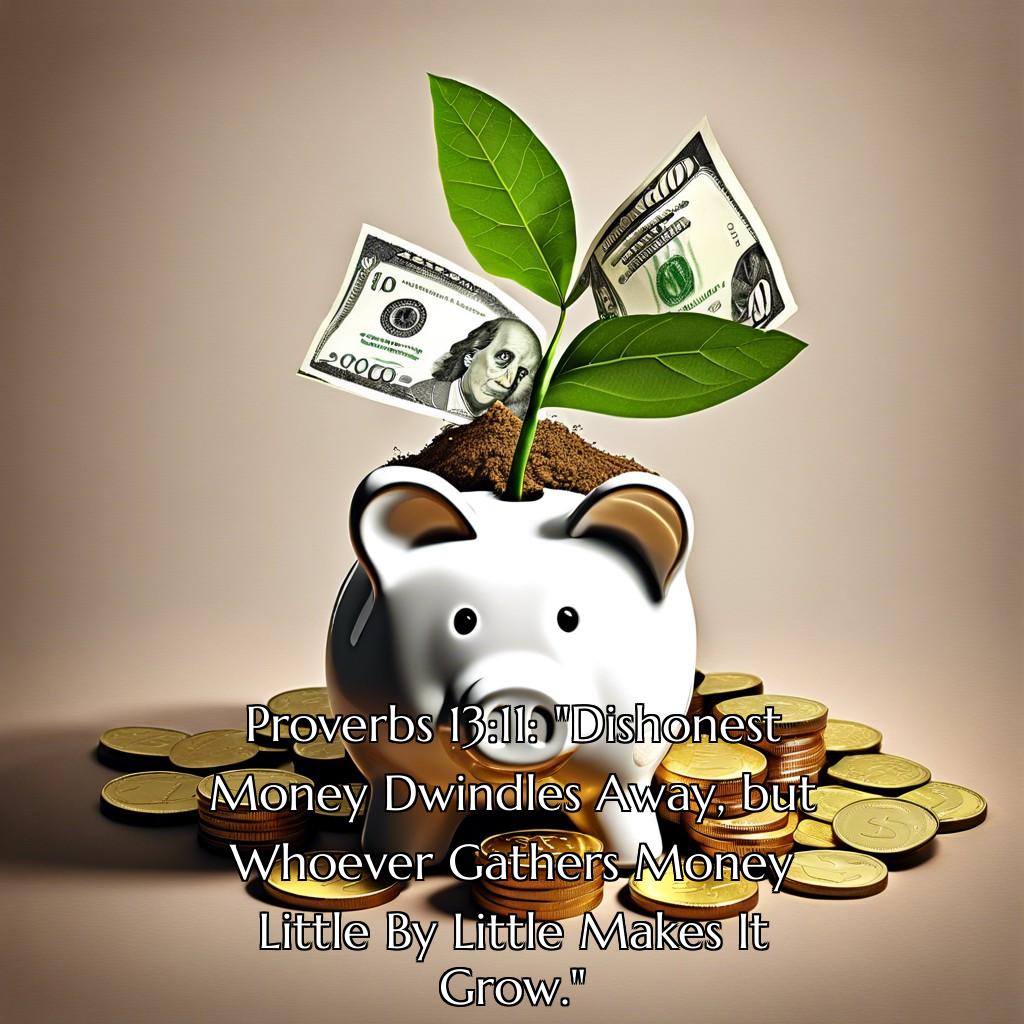This article provides meanings of ten Bible verses that offer insights about money.
Money is a significant part of our daily lives, yet the Bible offers timeless wisdom that goes beyond just financial management. Navigating verses about wealth, debt, and contentment provides guidance on how to handle money in a way that honors God. Discover profound insights from these carefully selected Bible verses to enrich your understanding and approach to money.
1 Timothy 6:10: “For the Love of Money Is a Root of All Kinds of Evil.”

The verse from 1 Timothy reminds us that it’s not money itself that’s problematic, but the love of it. Obsessing over wealth can lead to harmful behaviors and decisions. Here are some key concepts worth noting:
- Prioritizing Money: When money becomes the primary focus, it often displaces other values such as kindness, generosity, and integrity.
- Ethical Compromise: The pursuit of wealth can tempt individuals to compromise their morals, leading to dishonest actions or exploitation.
- Emotional Toll: Chasing after riches may cause anxiety, stress, and dissatisfaction, as one never feels they have enough.
- Relationship Strain: A love for money can strain relationships. It may cause envy or greed, disrupting harmony among friends and family.
Understanding these points can help us reflect on our own relationship with money and strive to keep it in proper perspective.
Proverbs 22:7: “The Rich Rule Over the Poor, and the Borrower Is Servant to the Lender.”

This proverb offers a straightforward observation about financial power dynamics. The wealthy often hold significant influence over the less fortunate. In society, financial resources can translate into authority and control.
Highlighting the reality of debt, it underscores that borrowing money can place one under the lender’s control. Debt can lead to financial dependency, limiting personal freedom and increasing stress.
This verse also serves as a caution. It advises prudence in managing finances to avoid becoming indebted and losing autonomy. By being mindful of spending and saving, one can strive to maintain financial independence and avoid the pitfalls of borrowing.
Matthew 6:24: “No One Can Serve Two Masters. Either You Will Hate the One and Love the Other, or You Will Be Devoted to the One and Despise the Other. You Cannot Serve Both God and Money.”

In this verse, Jesus makes a clear distinction between serving God and serving money. Here are a few key concepts:
– Exclusive Loyalty: Jesus emphasizes the impossibility of being loyal to both God and wealth. True devotion can only be directed towards one.
– Conflict of Interests: Serving God often calls for selflessness and generosity, whereas chasing wealth can lead to greed and selfishness.
– Heart’s Focus: Where your loyalty lies is where your heart’s focus will be. If money dominates your thoughts and actions, it detracts from your spiritual life.
– Spiritual Priority: Jesus encourages prioritizing spiritual well-being over financial gain. Spiritual richness brings eternal fulfillment, unlike material wealth.
– Daily Choices: Every day presents choices that align us more with either God or money. Jesus invites us to consciously choose God in our decisions.
This verse reminds us to examine our lives and ensure we are not letting the pursuit of wealth overshadow our commitment to God.
Luke 12:15: “Then He Said to Them, ‘Watch Out! Be On Your Guard Against All Kinds of Greed; Life Does Not Consist in an Abundance of Possessions.’”

Luke 12:15 emphasizes guarding oneself against greed and recognizing that true life isn’t found in material abundance.
- Greed Awareness: Jesus cautions to actively watch for greed, highlighting it as a subtle yet pervasive danger. Greed can distract from spiritual priorities.
- Value Beyond Possessions: The verse underscores that real worth isn’t measured by how much one owns. It invites reflection on what truly enriches life—relationships, faith, and love.
- Simplicity and Contentment: Encourages embracing simplicity and being content with what we have. It’s a call to find joy and satisfaction in the non-material aspects of life.
- Spiritual Focus: It serves as a reminder to focus on spiritual growth and community rather than accumulating wealth. Life’s greater meaning lies in connection with God and others.
Reflecting on these points helps shift the focus from accumulating wealth to nurturing spiritual and relational wealth.
Hebrews 13:5: “Keep Your Lives Free From the Love of Money and Be Content With What You Have, Because God Has Said, ‘Never Will I Leave You; Never Will I Forsake You.'”

This verse encourages us to focus on contentment rather than wealth accumulation. God’s promise to never leave us is a reminder that our security should lie in Him, not in money.
Firstly, loving money can steer us away from spiritual priorities. It can create a constant sense of dissatisfaction.
Secondly, contentment leads to peace. When we trust in God’s provision, we alleviate the anxiety that accompanies financial pursuits.
Lastly, knowing that God is always with us fosters a sense of enduring stability. Regardless of our financial situation, His presence provides the ultimate assurance.
Trust in these principles to lead a fulfilling life grounded in faith.
Proverbs 13:11: “Dishonest Money Dwindles Away, but Whoever Gathers Money Little By Little Makes It Grow.”

This verse emphasizes the importance of integrity and patience in financial matters. It warns against acquiring wealth through dishonest means, as such ill-gotten gains are likely to be short-lived and unstable. Instead, the verse encourages diligent and steady effort in building wealth.
Key points to understand:
- Value of Integrity: Gaining money dishonestly can lead to quick losses and ethical dilemmas.
- Steady Growth: Building wealth gradually, with consistent effort, is more sustainable.
- Long-term Prosperity: Honest, incremental accumulation of wealth leads to more secure and lasting financial stability.
- Patience: This process requires patience, reflecting a deeper trust in the value of hard work and ethical practices.
By focusing on these principles, one can achieve financial stability without compromising moral integrity.
Ecclesiastes 5:10: “Whoever Loves Money Never Has Enough; Whoever Loves Wealth Is Never Satisfied With Their Income. This Too Is Meaningless.”

This verse emphasizes the futility of an insatiable desire for wealth. It points out that loving money creates a void that is never full, leading to perpetual dissatisfaction.
Firstly, it highlights the endless cycle of craving more, demonstrating that wealth alone cannot bring true happiness or fulfillment.
Secondly, it suggests that constantly seeking more can trap individuals in a relentless pursuit, often at the expense of more valuable aspects of life, like relationships and inner peace.
Lastly, the verse reminds us that material possessions are temporary and ultimately meaningless in the grand scheme of life. It’s a call to reassess our priorities and find contentment in what truly matters.
Malachi 3:10: “Bring the Whole Tithe Into the Storehouse, That There May Be Food in My House. Test Me in This,’ Says the Lord Almighty, ‘and See If I Will Not Throw Open the Floodgates of Heaven and Pour Out So Much Blessing That There Will Not Be Room Enough to Store It.”

This verse emphasizes the principle of tithing—giving a portion of one’s income to God. It’s more than just an obligation; it’s an act of faith and trust in God’s provision.
Firstly, tithing shows our recognition that everything we have comes from God. It’s an acknowledgment of His sovereignty over our finances.
Secondly, God invites us to test Him in this area, which is unique in the Bible. This tests our faith and obedience while showcasing God’s faithfulness.
Thirdly, the promise of blessing is twofold: spiritual and material. God’s floodgates of blessing cover not only financial needs but also spiritual richness and fulfillment.
Lastly, tithing ensures that the needs of the community, represented by “food in my house,” are met, promoting a sense of collective responsibility and generosity.
Proverbs 3:9-10: “Honor the Lord With Your Wealth, With the Firstfruits of All Your Crops; Then Your Barns Will Be Filled to Overflowing, and Your Vats Will Brim Over With New Wine.”

This verse encourages acknowledging God with our finances and resources. By offering the first and best portion of what we earn, known as the firstfruits, we demonstrate trust and reverence.
Key concepts include:
- Honoring God with Wealth: Giving the first share of income reflects respect and dedication to God.
- Firstfruits: Symbolically offering the first and best part of our earnings establishes a priority on spiritual commitment over material gains.
- Divine Abundance: In return, God promises abundant blessings, filling barns and vats, signifying prosperity and sufficiency.
The principle here is about prioritizing faith and recognizing God’s provision through thoughtful and intentional giving.





